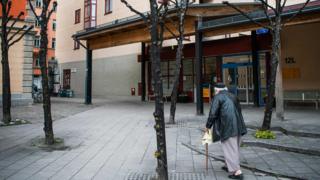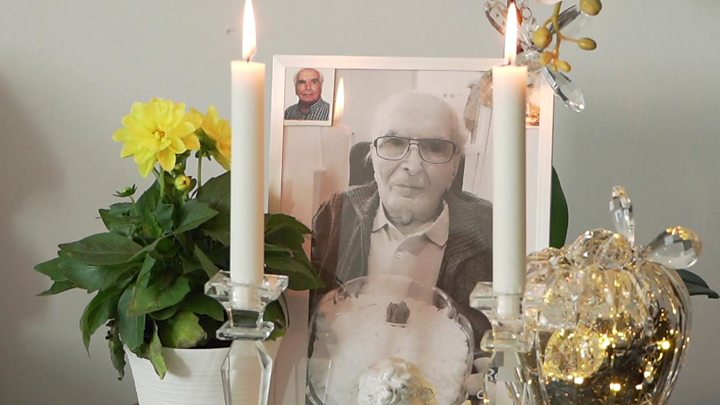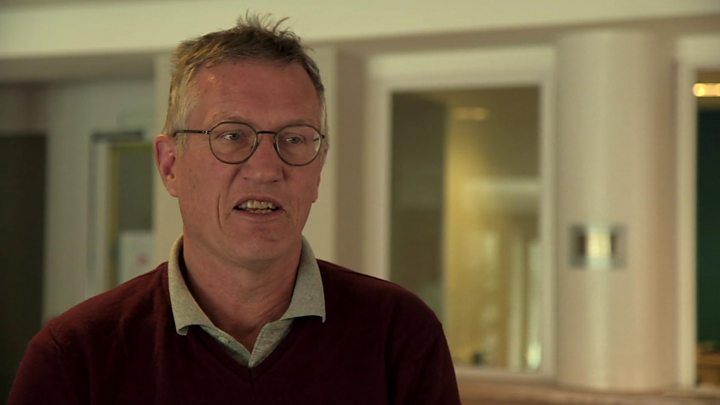 Image copyright
Getty Images
Image caption
Sweden's Prime Minister has admitted the country has not done enough to protect the elderly
Image copyright
Getty Images
Image caption
Sweden's Prime Minister has admitted the country has not done enough to protect the elderly
Care home residents account for nearly half of deaths linked to Covid-19 in Sweden. Some healthcare workers believe an institutional reluctance to admit patients to hospital is costing lives.
Lili Sedghi's father, Reza, was not seen by a doctor on the day he died from coronavirus, at his care home in northern Stockholm.
A nurse told her he'd had a morphine shot in the hours before he passed away, but he was not given oxygen, nor did staff call an ambulance. "No-one was there and he died alone," says Ms Sedghi. "It's so unfair."
Most of the 3,698 people who have died from coronavirus in Sweden so far were over 70, despite the fact that the country said shielding risk groups was its top priority.
Sweden, with 10m inhabitants, has kept more of society open than is the case in most of Europe.

Media playback is unsupported on your device
"We did not manage to protect the most vulnerable people, the most elderly, despite our best intentions," Prime Minister Stefan Löfven admitted last week.
The Swedish Public Health Agency told the BBC that 48.9% of deaths were care home residents up to and including 14 May.
Sweden did ban visits to care homes on 31 March. But as in many European countries, relatives, staff and union officials have shared concerns that protective clothing arrived too late, and that some staff may have gone to work at the start of the crisis despite showing symptoms of Covid-19.
Now, increasing numbers of workers are also coming forward to criticise regional healthcare authorities for protocols which they say discourage care home workers from sending residents into hospital, and prevent care home and nursing staff from administering oxygen without a doctor's approval, either as part of acute or palliative (end-of-life) services.
'We were told not to send them in'
"They told us that we shouldn't send anyone to the hospital, even if they may be 65 and have many years to live. We were told not to send them in," says Latifa Löfvenberg, a nurse who worked in several care homes around Gävle, north of Stockholm, at the beginning of the pandemic.
"Some can have a lot of years left to live with loved ones, but they don't have the chance... because they never make it to the hospital," she says. "They suffocate to death. And it's a lot of panic and it's very hard to just stand by and watch."
Image caption Latifa Löfvenberg works as a nurse in StockholmMs Löfvenberg, a local politician with the nationalist Sweden Democrats, is now working on a Covid-19 ward in a major hospital in the Swedish capital, where she says the demographic of patients she's treating is further evidence that the elderly are being kept away. "We don't have many older people. It's a lot of younger people born in the 90s, 80s, 70s."
A paramedic working in Stockholm, who wanted to remain anonymous, told the BBC she had not had a single call-out to an elderly care home connected to Covid-19, despite putting in overtime during the crisis.
Mikael Fjällid, a Swedish private consultant in anaesthetics and intensive care, says he believes "a lot of lives" could have been saved if more patients had been able to access hospital treatment, or if care home workers were given increased responsibilities to administer oxygen themselves, instead of waiting for specialist Covid-19 response teams or paramedics.
"If you need care and you can benefit [from] care, for example, or oxygen for a short time, you should have it. Like any other age group in the population," says Mr Fjällid, a right-wing critic of the centre-left led government.
"If you have more than 20% that survive without nothing, you could assume that also perhaps the same amount or the same proportion would have survived with supplemental oxygen."

Media playback is unsupported on your device
In April 10,458 people died in Sweden, making it the country's deadliest month since 1993, when there was an outbreak of seasonal flu, state-funded Statistics Sweden reports.
National guidelines
Decisions about healthcare staffing and resources are taken at a regional level in Sweden, although national guidelines suggest that elderly patients, whether in state or privately run care homes, should not automatically be taken to hospital for treatment.
Dr Thomas Linden, Chief Medical Officer at the National Board of Health and Welfare, says workers should "professionally weigh the potential benefits" against risk factors such as catching the virus in hospital and the "costs" of transporting patients, including the likelihood of disorientation and discomfort.
Healthcare workers are asked not to discriminate on age alone, he says, although biological age may be relevant in combination with other factors.
When it comes to providing palliative care, it is not mandatory to give patients oxygen, and Dr Linden admits "the opinions on the value of oxygen is divided between specialities and regions".
Gävleborg, the region where Latifa Löfvenberg worked at the start of the pandemic, says individual patients' needs are always put first and that nurses can call doctors to make assessments about the need for hospital care.
It is against the idea of care-home workers administering oxygen during palliative care, because it requires specialist training.
Christoffer Bernsköld, a spokesperson for geriatric care for Region Stockholm, insists there are enough resources to ensure patients in the capital get acute or palliative care, with a focus on "specialist homecare units" providing help in the first instance.
Image copyright Getty Images Image caption Most Swedish victims of the virus have been over 70 years oldHe points to a new, unused, military field hospital in southern Stockholm as proof that the elderly are not being held back from treatment because of a lack of beds.
But he says it can be an "ethical dilemma" whether to administer oxygen or transfer patients to hospital.
Critics like Mikael Fjällid see that field hospital as a sign that officials in the capital have been cautious about hospitalising the elderly because they fear overstretching resources, which would be needed to cope with a future spike in cases.
How do other countries prioritise patients?
Sweden is not alone in asking healthcare workers to consider the fragility of patients when deciding whether or not to send them to hospital.
But representatives of care homes in other parts of Europe have told the BBC they do not share Swedish critics' concerns about a lack of access to treatment.
In the UK, the National Care Association says it believes care has been available for Covid-19 patients "no matter how old or sick" they are.
The Association of German Aid for the Elderly and Disabled says every patient with coronavirus symptoms is seen by a doctor and there hasn't been a single patient who has not received the care they needed. In some cases, entire care homes have been moved into hospitals. Many homes also keep emergency oxygen on site.
The Danish Nurses Association says that all patients in need of oxygen are currently sent to hospital. This could be reviewed if there is a shortage of ventilators, although age would not affect future guidelines.
More funding and permanent jobs
At a recent news conference, Sweden's Prime Minister Stefan Löfven told the BBC that regional authorities had been trusted to make sure healthcare provision "works the best way" and given extra resources from the state to cover costs connected to Covid-19.
Last week the government also announced a further 2.2bn kronor (£185m) for additional training within care homes, with a view to creating 10,000 permanent positions for assistant nurses and care workers.
Mr Löfven said it wasn't currently the right time to reflect on potential failures, but a national commission would look at how things had been handled at a local, regional and national level as soon as the "acute" phase of the crisis was over.
That is a bittersweet message for relatives of Covid-19 victims like Lili Sedghi, who buried her father last week.
"Whatever they did didn't work, because... many, many people in his home are dead," she says.
Additional reporting by Sira Thierij.
Update 3 June: This article has been updated to make clear Latifa Löfvenberg is a member of the Sweden Democrats.

 5 years ago
769
5 years ago
769 

